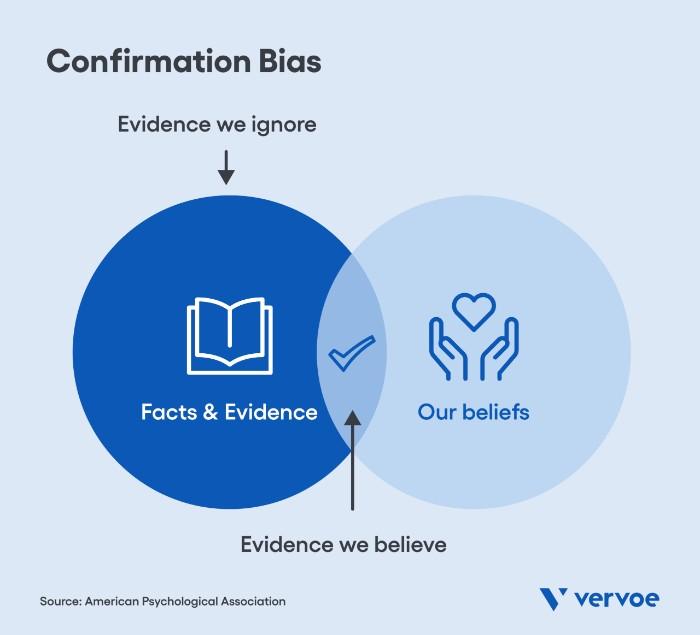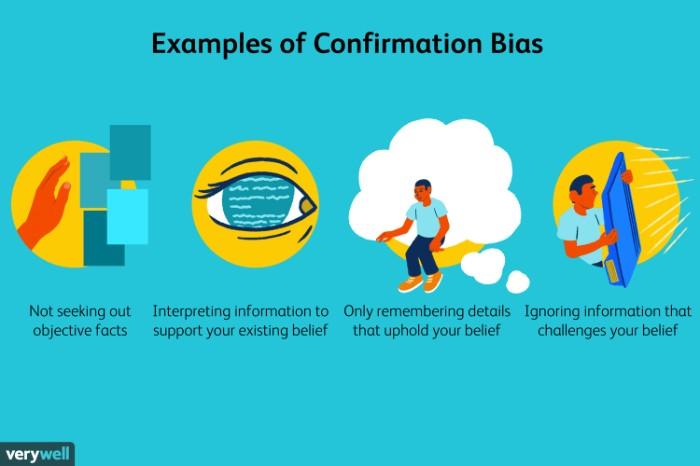Confirmation bias is one of our most powerful and potentially harmful psychological phenomena. Confirmation bias is the tendency to search for, interpret, favor, and recall information that confirms or reinforces our preexisting beliefs while ignoring or diminishing any evidence that could contradict them.
It can lead us to miss opportunities, make critical mistakes in judgment, and distort reality. As such, it is essential to understand what confirmation bias looks like to understand its influence on our decision-making process and work towards avoiding it.
Definition of Confirmation Bias
Confirmation bias is a type of cognitive bias that involves favoring information that confirms one's preexisting beliefs or biases. Confirmation bias often causes people to select, seek out, interpret, and remember information in ways that support their existing views. It can also lead to ignoring evidence that contradicts those views. Confirmation bias has been described as an “irrational bias” because it is based on prejudices or preconceived beliefs that can detract from objectivity.
Confirmation bias has been demonstrated in many areas, such as political and religious beliefs, research practices, and persuasive techniques used by organizations and the media. It is a type of cognitive dissonance, meaning that when people are presented with information that clashes with their own beliefs, they tend to reject it or discount its importance.
Although confirmation bias is a cognitive bias and can be seen as irrational behavior, it can also serve an important purpose in helping people form opinions and make decisions. People can more quickly and easily form opinions on complex topics by selectively interpreting information that reinforces one's preconceived views. In this way, confirmation bias helps individuals make decisions in their day-to-day lives without processing an overwhelming amount of information.
Examples of Confirmation Bias
Confirmation bias can manifest in all areas of life but is especially prevalent in politics and religious beliefs. For example, when an individual reads news articles or views political debates, they may seek out stories confirming their preexisting opinions while ignoring evidence contradicting them. Similarly, those with religious beliefs may embrace interpretations of scriptures or teachings supporting their beliefs while discounting any evidence to the contrary.
Confirmation bias can also be seen in the research methods used by scientists and academics. When studying a particular topic, researchers may look for information that supports their hypotheses while neglecting to consider evidence that contradicts it. This type of confirmation bias has been termed “selective reporting” and can lead to inaccurate research results.
In addition, corporations and other organizations often use confirmation bias as a persuasive technique. When trying to convince consumers or investors of the merits of a product or service, companies will sometimes emphasize information that supports their arguments while disregarding any evidence that might contradict them.
Confirmation bias is an important concept to be aware of, as it can lead to irrational decisions and inaccurate interpretations of the evidence. It’s important to recognize that existing beliefs or biases may affect how one interprets and remembers new information, so it’s important to consider all available evidence before forming opinions or making decisions.
Individuals can make more informed decisions and form accurate opinions on complex topics by understanding confirmation bias and striving to remain open to new information.
Effects of Confirmation Bias

Confirmation bias can have several negative effects on people's lives. It can lead to inaccurate interpretations of evidence and hasty conclusions based on limited information. This, in turn, can lead to poor decision-making and irrational behavior.
In addition, confirmation bias can impede critical thinking skills as it encourages individuals to accept ideas that may not be supported by evidence. Such beliefs can become entrenched and impede learning new information or seeing alternative perspectives.
Confirmation bias can also lead to polarization of views, as people tend to seek out and accept only those ideas that fit within their existing worldview. This can lead to “echo chambers” where one-sided views are reinforced, and alternative perspectives are rejected.
Finally, confirmation bias can lead to ill-informed and biased opinions that are difficult to change or modify. By relying heavily on evidence that conforms to one’s beliefs and ignoring contradictory information, individuals may become locked into their existing views and be less open to other possibilities.
It is important to be aware of the potential effects of confirmation bias to minimize its effects. Individuals can make more informed decisions and develop better-supported opinions on complex topics by recognizing and avoiding confirmation bias.
Understanding the dangers of confirmation bias can help one avoid becoming entrenched in their views, allowing one to remain open-minded and consider alternative perspectives. This can help people make more informed decisions and form accurate opinions on various topics.
Ways to Avoid Confirmation Bias
Avoiding confirmation bias is a difficult but important task. Here are some tips to help do so:
1. Seek out alternative perspectives and be open to the possibility that your beliefs may be wrong.
2. Listen carefully to opposing viewpoints and understand why they have them.
3. Consider all available evidence, not just supporting your beliefs.
4. Make decisions based on facts and evidence rather than assumptions or feelings.
5. Take a few moments to think before responding to new information or ideas.
6. Consider the source of any information: is it reliable or biased?
7. Don’t jump to conclusions too quickly. Give yourself time to evaluate the evidence and consider all possibilities.
By taking these steps, individuals can reduce the potential effects of confirmation bias and make more informed decisions based on facts rather than preconceived notions.
Confirmation bias is important to understand to avoid making hasty conclusions or irrational decisions based on limited information.
Strategies to Overcome Confirmation Bias

In addition to understanding and avoiding confirmation bias, some strategies can be used to help overcome it. These include:
1. Examine evidence without emotion or prejudice.
2. Ask questions and challenge your beliefs by finding evidence that disproves them.
3. Consider alternative interpretations of the available information instead of relying on the first interpretation that comes to mind.
4. Make an effort to identify and question any assumptions you might have about a particular topic or situation.
5. Consider all available evidence before deciding and be willing to change your opinion if necessary.
6. Seek out people with diverse backgrounds who can bring different perspectives.
7. Accept that there may not be a single “right” answer in some situations and be open to being wrong.
By employing these strategies, individuals can reduce their susceptibility to confirmation bias and make more informed decisions based on facts rather than preconceived notions or feelings.
FAQs
What is a confirmation bias example?
A confirmation bias example is when an individual only considers evidence confirming their beliefs and disregards contradictory information. For example, if a person believes the economy is in a recession, they may disproportionately focus on data that supports this belief while ignoring any evidence to the contrary.
What are the consequences of confirmation bias?
Confirmation bias can have serious consequences, such as forming inaccurate opinions on various topics or making irrational decisions based on limited information. It can also lead to an unwillingness to consider alternative perspectives and cause people to become entrenched in their beliefs.
What is confirmation bias caused by?
Confirmation bias is often caused by a need to feel more secure in one's beliefs. It can also be driven by an individual’s desire to avoid cognitive dissonance, which occurs when their existing beliefs are challenged by new information.
Conclusion
As we have explored, confirmation bias has the potential to be one of the most powerful and potentially harmful psychological phenomena in our lives. It is essential to understand what confirmation bias looks like so that we may recognize when it is influencing our decision-making process and work towards avoiding it.




